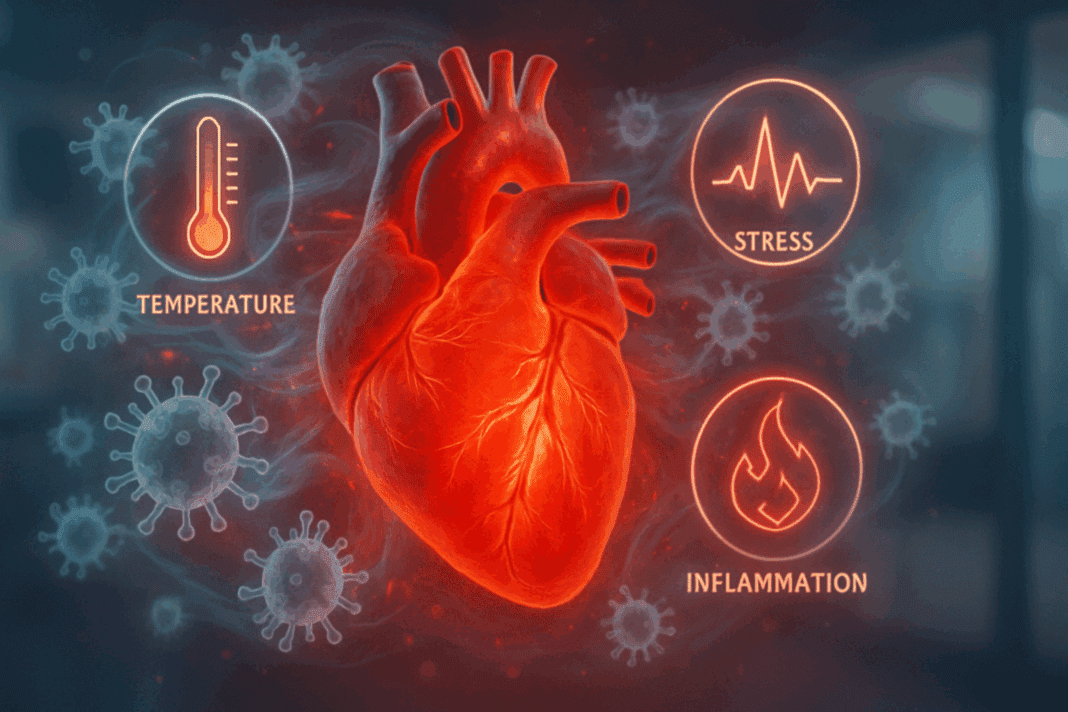Why Your Heart Races When You’re Sick? Illness doesn’t just make you feel fatigued, feverish, or nauseated. It often brings with it a series of physiological changes that are just as important to monitor as the overt symptoms. Among the most noticeable are changes in heart rate and blood pressure. Many people have asked themselves at some point: does your heart rate increase when sick? And if so, why? Similarly, questions like “can being sick raise your blood pressure?” or “does illness raise blood pressure?” are frequently searched online, especially when a routine check during a viral infection or fever reveals an unexpected spike in heart rate or blood pressure.
Understanding why the heart behaves differently when you’re sick involves exploring the body’s intricate response to stress, inflammation, fever, and other immune system processes. This article aims to uncover the connection between illness and cardiovascular responses, explaining why you might experience a high heart rate when sick, or notice that your resting heart rate has jumped to 120 during a bout of the flu. Whether you’re curious about the mechanics of a fever-elevated pulse or concerned about a fast heart rate while sick, this comprehensive guide is here to bring clarity through science-backed, medically sound explanations.
You may also like: Sudden Spikes in Blood Pressure: What Can Cause a Sudden Increase and When to Seek Medical Attention
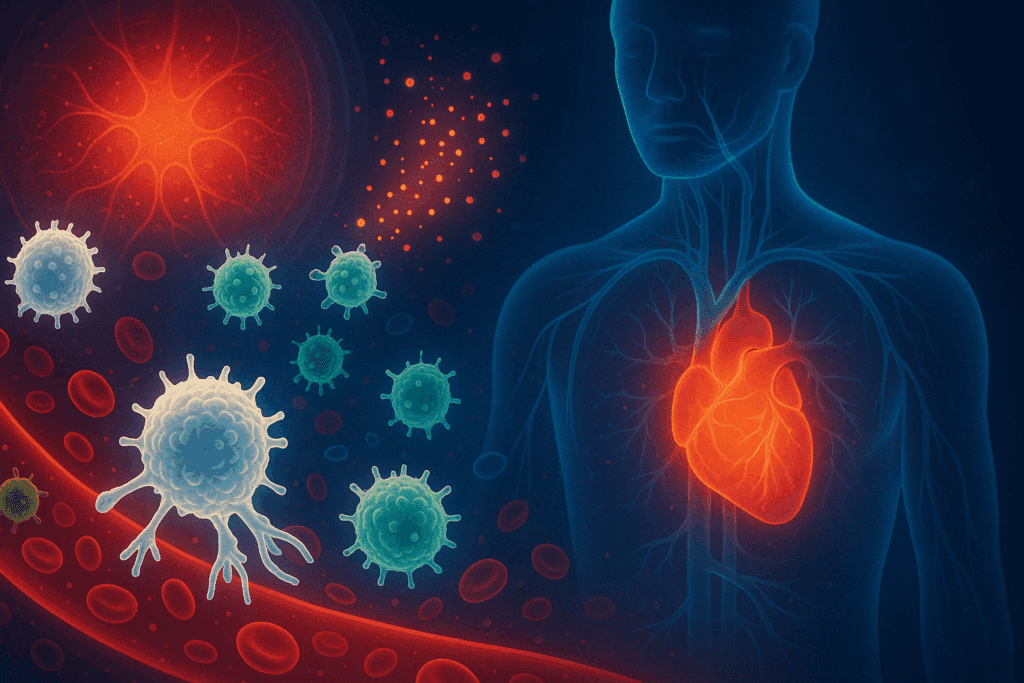
The Body’s Response to Illness: A Physiological Overview
When the body detects a pathogen such as a virus or bacteria, it launches a multi-faceted immune response. This defense mechanism includes the release of pro-inflammatory cytokines, elevated body temperature, and increased metabolic demands. These changes all serve the purpose of fighting off the invading microorganism. However, they also place additional stress on the cardiovascular system.
An elevated heart rate when sick is not merely coincidental. As the immune system activates, the sympathetic nervous system is also stimulated, preparing the body for a state of high alert. This fight-or-flight response can lead to an increased heart rate, which helps circulate immune cells more efficiently and distribute oxygen and nutrients to tissues that need support. In this context, a fast heartbeat when sick is a normal, adaptive reaction.
Likewise, blood pressure may rise due to systemic inflammation and vasoconstriction. The question “does being sick raise blood pressure?” is not just theoretical. Research has shown that acute illnesses, particularly those associated with pain, fever, or dehydration, can lead to elevated blood pressure when sick. The body’s cardiovascular system compensates by working harder, sometimes resulting in noticeable spikes in both heart rate and systolic blood pressure.
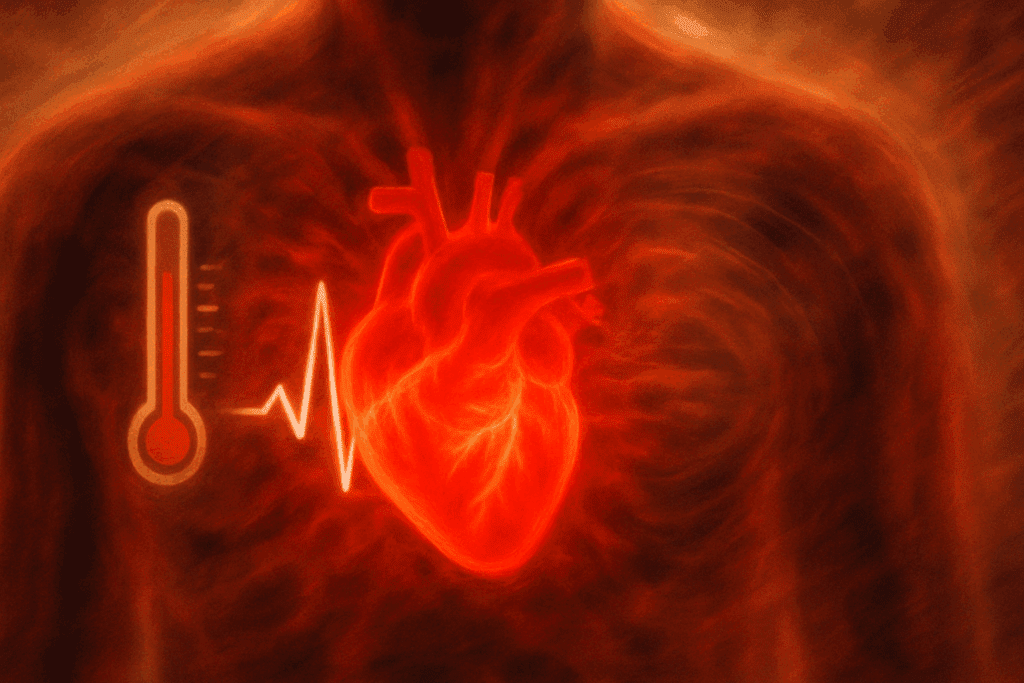
Understanding Heart Rate Changes During Illness
One of the most common and noticeable cardiovascular changes during illness is an increased heart rate. This phenomenon, referred to clinically as sinus tachycardia, is characterized by a resting heart rate above 100 beats per minute. For some individuals, the experience of a resting heart rate of 120 when sick can be alarming. Yet, this can fall within a normal physiological range depending on the severity of the illness and other contributing factors such as dehydration, anxiety, or fever.
So why does heart rate go up when sick? Fever plays a central role. For every 1-degree Fahrenheit increase in body temperature, heart rate tends to rise by approximately 10 beats per minute. This means that during a fever of 102°F, a person might experience a pulse rate significantly above their usual baseline. This fever-elevated pulse is a reflection of the body’s heightened metabolic needs. It also helps ensure rapid delivery of white blood cells and other immune mediators to sites of infection.
In certain cases, individuals might notice a heightened heartbeat when sick even in the absence of a significant fever. Anxiety about being ill, poor sleep, and reduced fluid intake can all contribute to a fast heart rate when sick. The sympathetic nervous system’s activation in response to stress further amplifies this cardiovascular stimulation. These changes are usually temporary but can feel quite intense during the peak of illness.
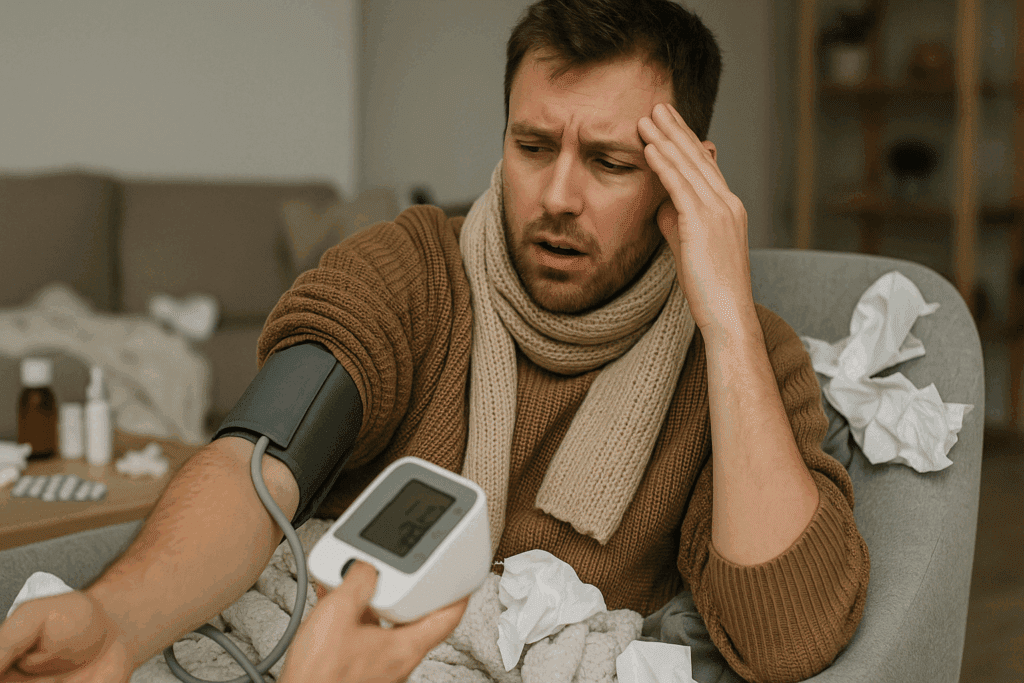
Illness-Related Hypertension: Does Being Sick Cause High Blood Pressure?
Just as heart rate may climb in response to illness, blood pressure can also be affected. Elevated blood pressure when sick is commonly observed during viral and bacterial infections. But can being sick cause high blood pressure that requires medical intervention? The answer depends on several contextual factors including age, baseline cardiovascular health, and the presence of underlying hypertension.
Systemic inflammation is one of the main culprits in temporary spikes in blood pressure. When cytokines are released, they can cause blood vessels to constrict. This vasoconstriction results in increased resistance in the vascular system, pushing blood pressure higher. Additionally, dehydration – a frequent side effect of fever, vomiting, or diarrhea – reduces blood volume, prompting the heart to work harder to maintain perfusion. This compensatory mechanism may explain why some people experience high blood pressure when sick.
Another contributing factor is the use of certain over-the-counter medications. Decongestants, for example, are known to raise blood pressure by constricting blood vessels. Individuals who are already hypertensive or sensitive to blood pressure changes should use these medications with caution. This makes it all the more important to monitor blood pressure during illness, especially for those wondering, “does your blood pressure go up when you are sick?”
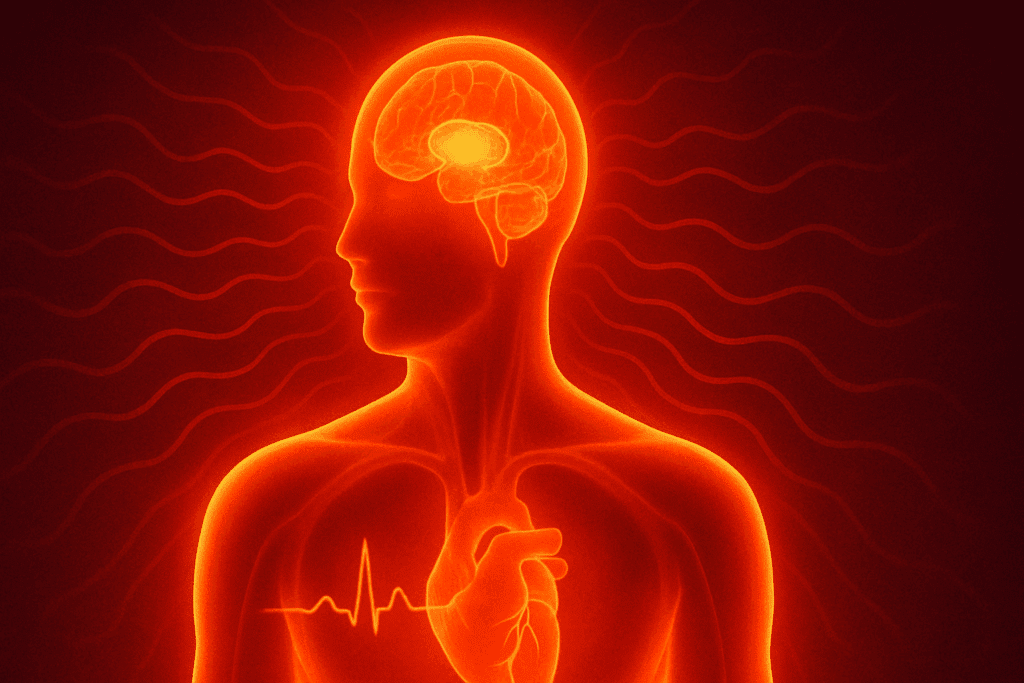
Fever and Its Influence on Heart Rate and Blood Pressure
Fever is a hallmark of many infectious diseases, and it exerts a powerful influence on cardiovascular parameters. A key question many patients ask is: does fever increase heart rate? The answer is unequivocally yes. As mentioned earlier, heart rate tends to rise in proportion to the degree of fever. This fever-elevated pulse is a direct result of thermoregulation mechanisms and metabolic acceleration.
The hypothalamus – the brain’s temperature control center – signals the body to retain heat and increase production of immune cells when fever is present. This process consumes energy, thus requiring a faster heartbeat to support the increased workload. The phenomenon of a rapid heart rate when sick with a fever can also be exacerbated by sweating and fluid loss, which further strain the cardiovascular system.
Moreover, fever can indirectly influence blood pressure. Although many people associate fever with lower blood pressure due to vasodilation and heat dissipation, this isn’t always the case. Infections that cause intense inflammation or involve the lungs (such as pneumonia or influenza) can lead to increased heart rate and elevated blood pressure. Consequently, people may experience both a fever-elevated pulse and a measurable spike in their systolic and diastolic values.
When to Be Concerned: Warning Signs and Red Flags
While an elevated heart rate with fever or a fast heart rate while sick is often a normal physiological response, there are instances where these symptoms could indicate a more serious condition. If your resting heart rate exceeds 120 consistently while you are at rest, or if you experience chest pain, shortness of breath, dizziness, or fainting, immediate medical evaluation is necessary.
Tachycardia that does not resolve after the illness subsides may signal an underlying cardiovascular issue or a post-viral condition such as myocarditis or postural orthostatic tachycardia syndrome (POTS). Likewise, persistent high blood pressure when sick could unmask previously undiagnosed hypertension or indicate complications like kidney involvement or an inflammatory condition affecting the vascular system.
People with pre-existing heart disease, hypertension, or diabetes should be especially vigilant. For them, even a temporary increase in blood pressure or heart rate can pose significant risks. If you’re asking, “can your blood pressure go up when you are sick, and should I be worried?” – the answer lies in context. For healthy individuals, these changes are usually harmless. For at-risk populations, they could signal a need for closer monitoring or treatment.
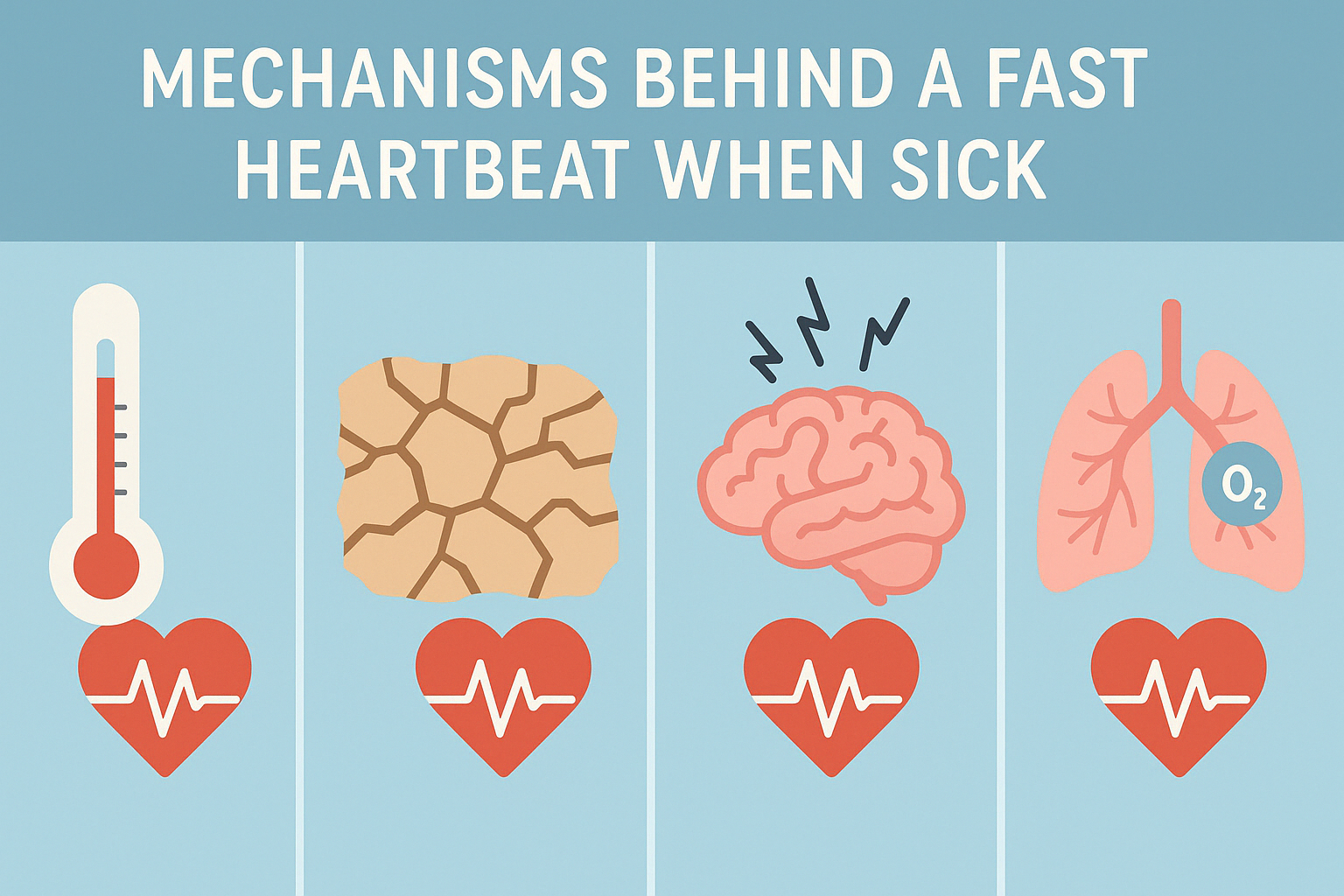
Mechanisms Behind a Fast Heartbeat When Sick
Beyond fever, several other mechanisms contribute to a rapid heart rate when sick. One of the most prominent is dehydration. Whether due to fever-induced sweating or gastrointestinal loss, reduced fluid levels mean lower blood volume. To compensate, the heart must beat faster to maintain adequate circulation. This is one reason why a fast heart rate when sick is often observed alongside dry mouth, lightheadedness, and decreased urine output.
Another contributor is hypoxia, particularly in illnesses that affect the lungs. When oxygen levels drop, the heart works harder to deliver available oxygen to tissues. This is particularly relevant in respiratory infections like COVID-19 or influenza, where oxygen saturation may fall even without obvious symptoms. An elevated heart rate with fever in these cases can be a compensatory mechanism for reduced oxygen delivery.
Psychological stress should not be underestimated either. Being sick often triggers anxiety, and anxiety itself can increase heart rate through activation of the sympathetic nervous system. This contributes to a feeling of a heightened heartbeat when sick, even if there are no serious underlying complications.
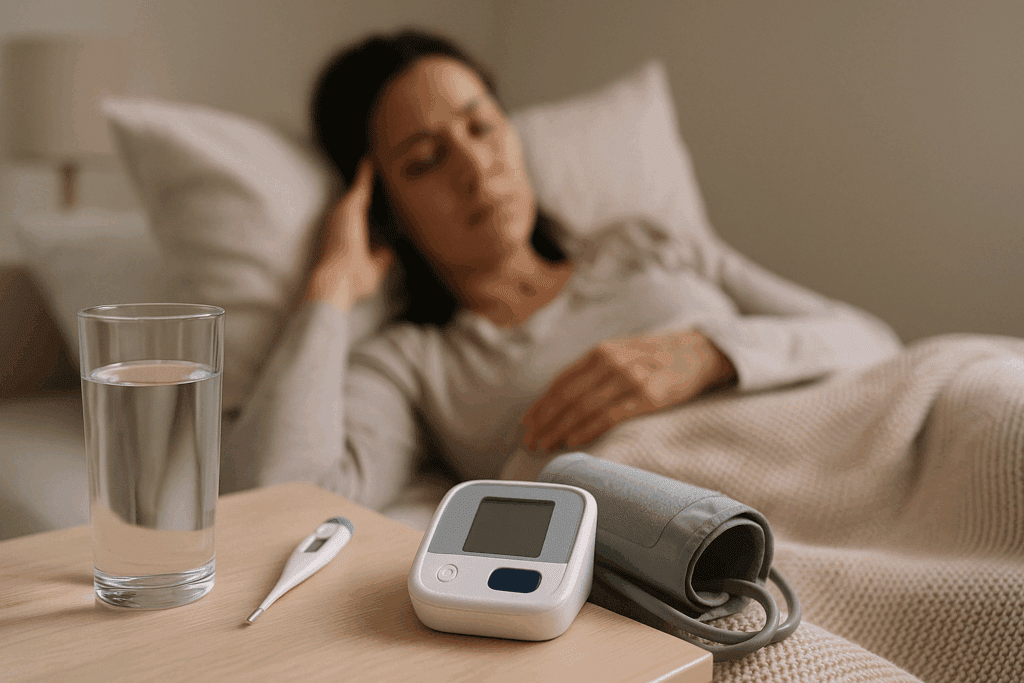
Managing Elevated Heart Rate and Blood Pressure During Illness
Understanding that these cardiovascular changes are part of the body’s natural response is reassuring, but it doesn’t mean they should be ignored. Managing a high heart rate while sick or elevated blood pressure when sick involves several key strategies.
Hydration is perhaps the most important and easily implemented step. Ensuring adequate fluid intake supports blood volume and helps the heart maintain normal rhythm. Rest is equally essential. Avoiding strenuous activity while ill reduces the demand placed on the heart, allowing it to beat more slowly. Cooling strategies like lukewarm baths or fever-reducing medications can also lower both temperature and associated cardiovascular strain.
For those who regularly monitor their vitals, tracking patterns in heart rate and blood pressure can provide insight into recovery. If your fast heart rate while sick returns to baseline as your illness resolves, this is typically a good sign. If abnormalities persist, or if you observe a resting heart rate of 120 when sick without a clear cause such as fever or dehydration, consult with a healthcare provider.
Implications for Chronic Conditions and Long-Term Health
While most temporary increases in heart rate and blood pressure during illness are harmless, they can have greater implications for individuals with chronic conditions. For example, those with hypertension may find that an illness temporarily disrupts their medication regimen or requires adjustments to treatment. Similarly, people with cardiovascular disease might be more vulnerable to complications from infections that involve cardiovascular stress.
This underscores the importance of preventive healthcare, including vaccinations for flu, COVID-19, and pneumonia. Preventing the infection in the first place can reduce the likelihood of a fever-elevated pulse or high blood pressure while sick. For those managing chronic illness, regular checkups and home monitoring of blood pressure and heart rate provide a useful safety net during periods of acute illness.
It’s also important to recognize when a temporary symptom may hint at a deeper issue. Recurrent infections that always lead to a heightened heartbeat when sick could suggest an underlying problem with autonomic regulation or adrenal function. Likewise, if you find that even mild colds cause a sustained resting heart rate of 120 when sick, it may be worth exploring further cardiovascular evaluation.
Frequently Asked Questions: Heart Rate and Blood Pressure Changes During Illness
Why does your heart rate increase when sick, even if you don’t have a fever?
While fever is a well-known factor in an increased heart rate when sick, it isn’t the only cause. Psychological stress, especially health-related anxiety, can stimulate the sympathetic nervous system, resulting in a fast heartbeat when sick. Hormonal fluctuations also play a role, as cortisol and adrenaline levels rise during acute illness, which can trigger a fast heart rate while sick even in the absence of high body temperature. Additionally, poor sleep, changes in eating patterns, and reduced physical activity can contribute to cardiovascular shifts. Therefore, even without a fever-elevated pulse, it’s quite common to experience an elevated heart rate when sick due to a complex interplay of physiological and behavioral stressors.
Can being sick raise your blood pressure if you’re otherwise healthy?
Yes, even in individuals without pre-existing hypertension, illness can cause blood pressure fluctuations. When you’re fighting off an infection, inflammatory processes and immune responses activate systems in the body that can lead to vasoconstriction, resulting in elevated blood pressure when sick. Temporary spikes are not uncommon and can be amplified by factors like dehydration, over-the-counter cold medications, and stress. So if you’re wondering, “does your blood pressure go up when you are sick?” the answer is often yes—even in those with no history of cardiovascular disease. However, once the illness resolves, blood pressure typically returns to normal, unless an underlying issue is unmasked.
Is a resting heart rate of 120 when sick a medical emergency?
A resting heart rate of 120 when sick is significantly above the normal range and may warrant medical attention, particularly if it is persistent or accompanied by other symptoms such as chest discomfort, dizziness, or shortness of breath. While increased heart rate when sick is common, especially in the presence of fever, sustained tachycardia without clear justification could indicate dehydration, sepsis, or cardiac stress. Infections that affect the lungs or cause systemic inflammation may result in a high heart rate while sick, putting additional strain on the heart. Medical evaluation can help determine whether the rapid heart rate when sick is a temporary response or part of a larger, more serious condition.
Can children and adolescents experience a fast heartbeat when sick more often than adults?
Yes, children often experience a fast heartbeat when sick more readily than adults due to their naturally higher baseline heart rates and more reactive autonomic nervous systems. For them, even minor viral illnesses can cause a noticeable spike, which is usually benign. Pediatric cases of elevated heart rate with fever are common and tend to resolve with proper hydration and rest. However, just like in adults, persistent symptoms such as a high heart rate while sick that doesn’t improve post-recovery should be investigated. Parents should also be cautious about fever-elevated pulse readings in young children, especially if the child seems unusually fatigued or breathless.
How can dehydration intensify high blood pressure when sick?
Dehydration is a frequently overlooked but potent factor that can cause or exacerbate high blood pressure when sick. When the body loses fluids through fever, vomiting, or diarrhea, the blood becomes more concentrated, which increases vascular resistance. This mechanism can answer questions like, “can being sick increase blood pressure?” with a definitive yes—especially in the context of fluid imbalance. Moreover, the kidneys may reduce urine output to compensate, which can trigger hormonal systems like the renin-angiotensin-aldosterone system that further raise blood pressure. Maintaining hydration is critical for moderating both heart rate and blood pressure during illness.
Why does your blood pressure go up when you are sick, even if you feel physically exhausted?
Physical fatigue and elevated blood pressure may seem contradictory, but they often occur simultaneously during illness. The feeling of exhaustion stems from energy depletion, while elevated blood pressure when sick arises from vascular and nervous system responses. The body enters a heightened alert state during infections, mobilizing resources even when you feel too weak to get out of bed. The cardiovascular system continues to work harder, which helps explain why blood pressure rises even when you’re not active. So yes, does blood pressure rise when sick? Absolutely—and sometimes the increase is paradoxically coupled with feelings of profound tiredness.
Are fast heart rate and high blood pressure connected during illness, or do they occur independently?
While fast heart rate and high blood pressure often occur together during illness, they are driven by both shared and distinct mechanisms. Elevated heart rate with fever usually stems from thermoregulation and sympathetic nervous system activation, whereas blood pressure may rise due to fluid shifts, inflammation, or medications. Still, both are stress responses that can be influenced by overlapping hormonal and neurological factors. Understanding that a fast heart rate while sick can occur independently of elevated blood pressure helps differentiate potential causes and necessary treatments. Monitoring both vitals offers a fuller picture of cardiovascular stress when you’re unwell.
Can being sick cause high blood pressure long-term, or is it always temporary?
For most healthy individuals, the answer to “can being sick cause high blood pressure long-term?” is no. These elevations are typically short-lived and resolve once the illness subsides. However, repeated episodes of illness-related hypertension, especially in individuals predisposed to cardiovascular conditions, could unmask or accelerate the development of chronic hypertension. If you notice recurring patterns where your blood pressure is high when sick and remains elevated even after recovery, it may be worth investigating further. Over time, even transient spikes during illness can contribute to cumulative cardiovascular strain in susceptible individuals.
What lifestyle habits can minimize elevated heart rate when sick?
To mitigate an elevated heart rate when sick, prioritizing hydration and rest is crucial. Avoiding caffeine and alcohol during illness can also help stabilize your heart rhythm. Stress management techniques like deep breathing and mindfulness can blunt the sympathetic nervous system response, reducing the likelihood of a fast heartbeat when sick. Nutrient-dense meals, even in small portions, support metabolic needs and reduce cardiovascular load. These proactive measures not only help control a fast heart rate while sick but also facilitate overall recovery and reduce long-term strain on the heart.
Should you monitor your vitals at home if you experience a high heart rate or elevated blood pressure during illness?
Absolutely. Home monitoring can be an effective way to understand how your body is responding to illness and when to seek medical help. Devices like pulse oximeters and digital blood pressure cuffs allow you to track signs such as a high heart rate while sick or elevated blood pressure when sick in real time. If you consistently notice a resting heart rate of 120 when sick or repeated episodes where your blood pressure rises during mild illnesses, documenting this information can aid healthcare providers in making accurate diagnoses. Early detection of patterns can also answer broader questions like, “does illness raise blood pressure in my case?” or “does fever increase heart rate consistently for me?” with actionable insights tailored to your health profile.
Final Thoughts: Why Monitoring Heart Rate and Blood Pressure When Sick Matters
Understanding how your body reacts to illness, especially in terms of heart rate and blood pressure, offers more than just reassurance. It provides an opportunity for early detection, preventive care, and a more informed approach to your health. For most people, an increased heart rate when sick, especially in the presence of fever, is a normal adaptive response. Similarly, if you’re wondering, “can being sick raise your blood pressure?” the answer is often yes—but usually temporarily and without long-term consequence.
However, persistent or severe changes should never be ignored. Elevated heart rate with fever or fast heart rate while sick can occasionally be signs of more complex health issues. By staying hydrated, managing fever, and monitoring your vitals, you can help your cardiovascular system weather the storm of illness more effectively. And if your body’s signals seem out of proportion to the illness, don’t hesitate to seek medical guidance.
The bottom line? Does your heart rate increase when sick? Yes, and often for good reason. But understanding when that increase is part of normal physiology versus a sign of something more serious is key to protecting your long-term heart health. The same goes for blood pressure. If you’ve ever wondered, “can your blood pressure be high when sick?” now you know the answer—and why it matters.
Was this article helpful? Don’t let it stop with you. Share it right now with someone who needs to see it—whether it’s a friend, a colleague, or your whole network. And if staying ahead on this topic matters to you, subscribe to this publication for the most up-to-date information. You’ll get the latest insights delivered straight to you—no searching, no missing out.
Further Reading:
Why Your Heart Rate Goes Up When You’re Sick


